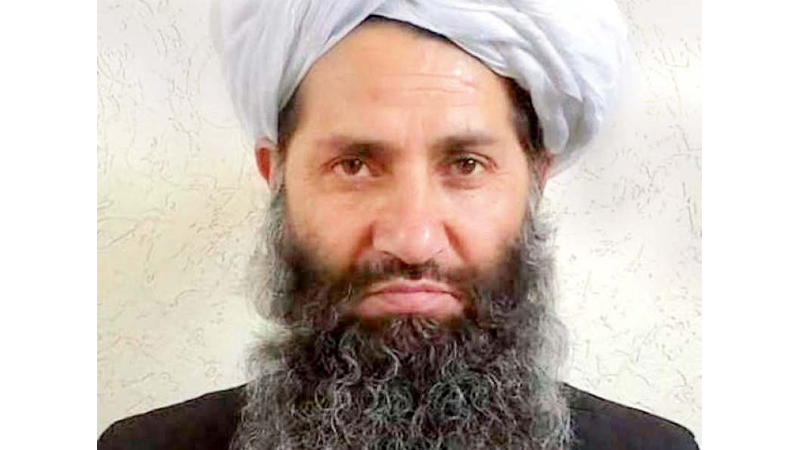 Taliban chief Mawlawi Hibatullah on Wednesday urged the United Sates not to allow anyone derail the agreement that paves the way for withdrawal of all foreign forces and end the nearly 20 years of war in Afghanistan.
Taliban chief Mawlawi Hibatullah on Wednesday urged the United Sates not to allow anyone derail the agreement that paves the way for withdrawal of all foreign forces and end the nearly 20 years of war in Afghanistan.
The US and the Taliban signed the landmark agreement in Qatar in late February, however, the agreement faces challenges due to spike in violence and Afghan government’s refusal to release Taliban prisoners.
The Taliban-US agreement says up to 5,000 prisoners of the Taliban and up to 1,000 prisoners of the Afghan government will be released by March 10, the first day of the intra-Afghan dialogue.
Hibatullah used his Eid message to call for the “safe and quick release” of Taliban detainees, who he said are languishing in “harsh and difficult conditions in the prisons of the Kabul administration.”
Taliban and US sources told Daily Times that the American special envoy Zalmay Khalilzad wrapped up two-day talks with the Taliban negotiators in Qatar on Wednesday before his visit to Kabul.
Khalilzad met President Ashraf Ghani and both called for ceasefire and reduction of violence before the start of the talks between the Taliban and the government, presidential palace said.
A statement said Khalilzad showed willingness to discuss the issue with the Taliban.
Both sides also discussed the issue of prisoners and called for adopting a clear and logical mechanism.
Khalilzad said on Friday that the US wants to get to the intra-Afghan negotiations as soon as possible, and there has been a discussion of dates both in the agreement – that date was missed – and now a new date is under discussion.
The Taliban chief neither mentioned the intra-Afghan dialogue nor calls by the international community and Afghan government for a humanitarian ceasefire in his Eid message.
“I urge American officials to not afford anyone the opportunity to obstruct, delay and ultimately derail this internationally recognized bilateral agreement between us and you,” the Taliban supreme commander said while addressing the US.
“The text of the agreement is explicit and constitutes a promising framework beneficial for both our nations and for problem resolution that must be fully implemented. Let us move forward with the implementation phase so that a path is paved for the withdrawal of your forces and for peace and security to take hold in Afghanistan and the region,” he said.
Hibatullah said signing of the historic agreement with the US and the resultant termination of occupation is an extraordinary accomplishment for the Taliban and Afghan nation that can prove beneficial for all sides if implemented sincerely. He said Taliban are committed to the agreement signed with America and urged the other side to honor its own commitments and not allow this critical opportunity go to waste.
“The implementation of this agreement can prove to be a powerful instrument for bringing an end to the war between America and our country and for establishing peace and an Islamic system in our homeland,” he said.
Afghan officials criticized the Taliban leader’s message and said Hibatullah has “asked the Taliban to continue fighting & kill more.”
“Afghans need peace, not more lives taken, and infrastructures destroyed. War isn’t a good present to give the Afghans in Eid after that bloodshed in Ramadan. Taliban waste chances for peace,” Javid Faisal, spokesperson for the Office of the National Security Council said in a twitter post.
Hibatullah also spoke about the Taliban relations with the international community and said political relations of the Taliban with regional and world countries have “broadened tremendously compared to the past as trust and confidence is built based” on the Taliban clarifying its stance and policy to others.
“On the basis of our policy – we seek to have brotherly relations with Islamic countries, neighborly relations with our neighbors and strengthening of constructive relations with all regional and world countries in order that obligations be discharged vis-à-vis regional and global economic prosperity, security and communal life. And we hope that other countries reciprocate and take similar steps,” the Taliban leader said.
In response to reservations about the future political system following the withdrawal of foreign forces, he assured the people that Taliban do not have a “monopolist policy”